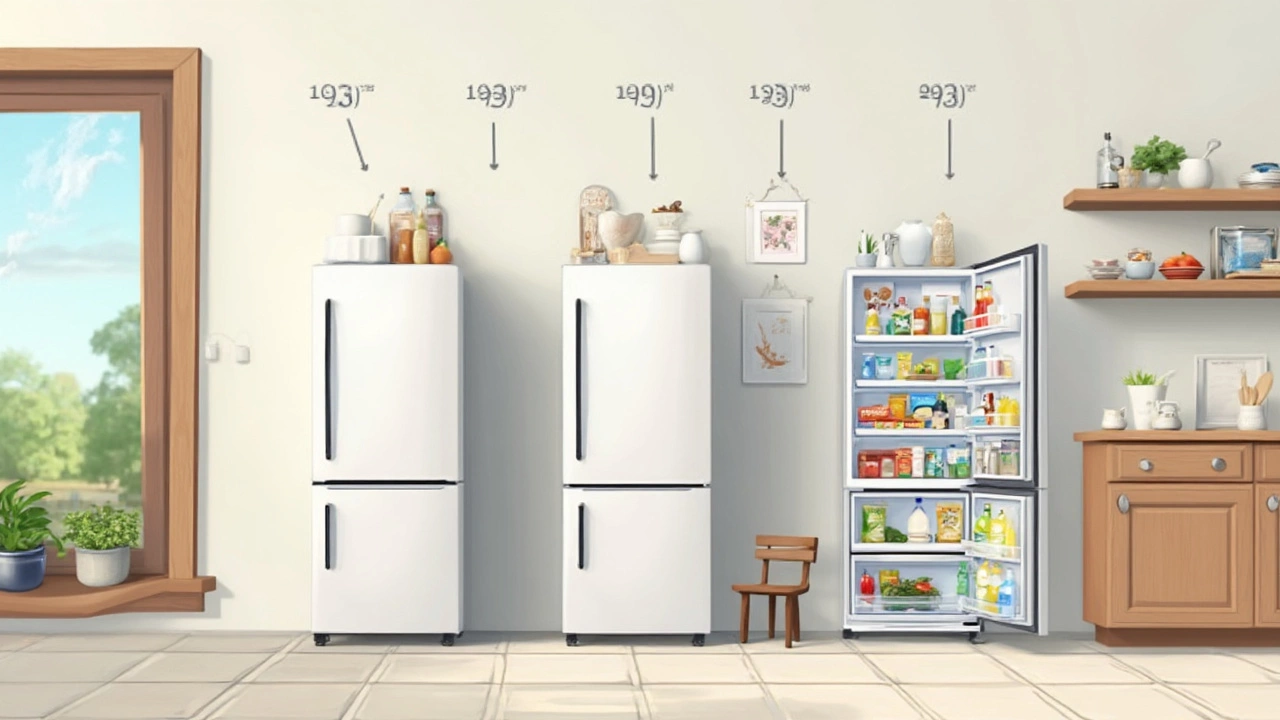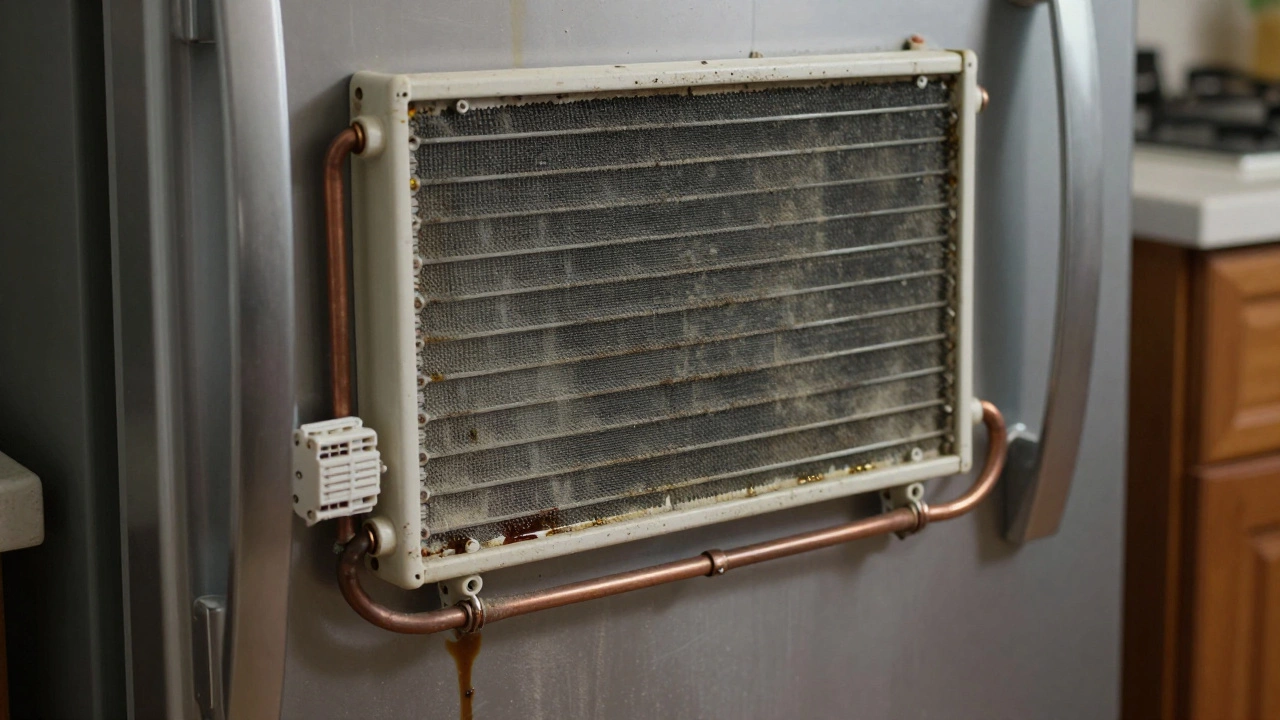
- 30 Apr 2025
- Gideon Thornton
- 0
If your fridge is getting older, you’ve probably asked yourself, “How much longer can this thing keep going?” Most folks don’t realize there’s actually an average lifespan for refrigerators, and ignoring those creeping signs of aging can leave you with a pile of spoiled groceries.
So here’s the deal: a typical fridge lasts around 10 to 15 years. Some keep chugging along for longer, especially if you keep them clean and catch little problems early. Others quit way sooner, sometimes because of heavy use or just random bad luck with certain models. If your fridge came with the house and you’ve never replaced it, there’s a good chance you’re staring at an appliance that’s living on borrowed time.
But all fridges aren’t created equal. How you use it, how well it’s made, and even where you put it can all shave—or add—years off its life. I’ll show you how to spot trouble before you wake up to warm milk and wilted lettuce.
- How Long Does a Refrigerator Really Last?
- What Impacts a Fridge’s Lifespan?
- Signs Your Fridge Is Nearing the End
- How to Get More Years Out of Your Fridge
- When Is It Worth Repairing vs. Replacing?
- Surprising Fridge Lifespan Myths
How Long Does a Refrigerator Really Last?
So, how long should you count on your refrigerator before it taps out? Most fridges last between 10 and 15 years. If you ask around, you’ll hear stories about some surviving over 20 years, but they’re the exception, not the rule. The general sweet spot for average fridge life is right around 13 years, according to a 2023 Consumer Reports survey.
Fridges made in the last 10 years tend to have more electronics and energy-saving features, but sometimes that tech leads to an earlier breakdown compared to those chunky ‘90s models. On the flip side, newer fridges use way less power—so you save on energy, just maybe not on repairs.
| Fridge Type | Average Lifespan (Years) |
|---|---|
| Top Freezer | 13-15 |
| Side-by-Side | 10-12 |
| Bottom Freezer | 12-15 |
| French Door | 9-13 |
Why the difference? Simpler fridges with fewer moving parts, like the classic top freezer, usually stick around longer. The fancy French door models do all kinds of extra things and have more parts that can break—so they don’t always last as long.
Here’s the kicker: your refrigerator lifespan is not just about years ticking by. How you use it, where you keep it, and how often you maintain it will make a huge difference. Don’t just look at the calendar—pay attention to how your fridge is actually running.
What Impacts a Fridge’s Lifespan?
Lots of folks don’t realize how much simple habits and environment affect their fridge. The refrigerator lifespan isn’t just about the calendar ticking by. Here’s what really makes a difference:
- Build Quality: Cheaper models and off-brand fridges usually don’t last as long as well-known brands. Small components, like compressors and thermostats, are more likely to fail if they’re poorly made.
- Maintenance: Skipping little jobs, like cleaning the condenser coils or changing the water filter, actually shortens a fridge’s life. Dusty coils make your fridge work way harder, and that ages it fast.
- Location: Is your fridge squeezed between the oven and the wall? Putting it somewhere hot or where it can’t vent raises its temperature. That makes it struggle, and the average fridge life takes a hit.
- Usage: If you’re always opening and closing the door, or you overload the shelves, the motor basically never rests. This constant cycling wears out the parts quicker.
- Power Surges: Electrical spikes can toast the control board or compressor. Surge protectors cost a few bucks but can save you from a giant repair bill.
- Temperature Settings: Cranking the dial colder than needed? You’re just burning more energy and making your fridge run more. Aim for 37°F (3°C) in the fridge and 0°F (-18°C) in the freezer.
To give you a feel for how different factors stack up, check out this table:
| Factor | Impact on Lifespan (Years) |
|---|---|
| Poor Maintenance | Reduce by 2-4 years |
| Proper Placement | Add up to 2 years |
| Heavy Daily Use | Reduce by 1-3 years |
| Quality Model | Add 3-5 years |
So yeah, the way you treat your fridge can move the needle a lot on that when to replace fridge question. If you stay on top of these things, you’ll likely see your fridge go the distance.
Signs Your Fridge Is Nearing the End
When a refrigerator is about to call it quits, it usually doesn’t just drop dead overnight. There are clear signs you can spot before the breakdown hits. Ignoring them just means more food waste and stress down the line.
- Food Spoils Faster: If your milk goes bad way sooner than the date on the carton, your fridge is probably not keeping a steady, cool temperature. That’s one of the classic red flags.
- Loud or Unusual Noises: Old fridges often start sounding like a truck backfiring in your kitchen. Clicking, buzzing, or knocking noises that weren’t there before? Not a good sign.
- Excess Condensation or Frost: Check for too much sweating on the outside or inside, or chunks of ice building up where they shouldn't. Usually, this means the seals aren’t doing their job or the internal parts are working overtime and failing.
- Motor Runs Constantly: Most fridges cycle on and off throughout the day. If you notice yours seems to be running all the time or way more than normal, that’s a hint it’s struggling to keep cold.
- Back Feels Hot: It’s normal for the back of a fridge to feel warm. But if it’s straight-up hot to the touch, the coils might be failing or clogged, and the unit is working harder than it should.
- Visible Rust or Cracks: If you spot rust on the door or cracks inside, those aren’t just ugly—they usually mean age or leaks, which can mess with the cooling system.
A 2024 Home Appliance Trends report from Statista showed that about 20% of fridge repair calls end up with people buying a new unit right after—that’s often because they missed or ignored these signs for too long.
"When your refrigerator struggles to hold temperature or starts cycling on more frequently, it’s often more cost-effective to replace it than keep patching things up." – Tim Rogers, certified appliance technician (quoted in Consumer Reports, January 2024)
Pay attention to these warning flags. Acting early might save your groceries and your wallet. If you’re seeing two or more of these issues, it’s probably time to think about a new refrigerator or at least get a pro to check it out before it breaks for good.

How to Get More Years Out of Your Fridge
Want to squeeze every last year out of your refrigerator? Keeping your fridge running strong isn’t rocket science, but skipping basic care really will shorten its life. Here’s what actually helps:
- Clean the coils regularly. Dirty condenser coils make the fridge work harder and use more energy. Slip the fridge away from the wall and use a coil brush or vacuum about twice a year. You’ll be shocked by the gunk back there.
- Set the right temperature. Stick with 37–40°F for the fridge and 0°F for the freezer. Any colder is just wasting energy and stressing the system.
- Don’t block the air vents. Those little vents in the back and sides let cold air move around. Overstuff the shelves, and you choke the air flow—so some food gets too warm, and the fridge strains itself.
- Keep the door seals tight. Try the dollar bill test. Shut the door on a bill: if you can pull it out easily, your rubber gasket probably needs a clean or even a replacement. Leaky seals invite warm air and kill your fridge’s life fast.
- Don’t let frost build up. Frost is usually a sign of air leaks (check those seals again). If you get heavy ice, defrost it sooner rather than later.
- Give it some space. Leave a few inches between the back of the fridge and the wall. Jam it up tight, and you starve the coils of air, which leads to overheating.
- Be gentle with the door. Slamming it adds wear and tear. Also, try not to hang bags or heavy stuff on the door shelves—that puts extra stress on the hinges.
Here’s a handy table showing how simple maintenance affects a refrigerator lifespan:
| Care Habit | Years Added to Life (approx.) |
|---|---|
| Coil Cleaning | +2-3 years |
| Seals Check & Replace | +1-2 years |
| Proper Temp Setting | +1 year |
| Spacing for Airflow | +1 year |
Nothing fancy, just small habits that really make your fridge last as long as possible. The better you treat it, the less you’ll spend on repairs—and midnight trips to buy ice for your melted food.
When Is It Worth Repairing vs. Replacing?
This is the big question that stumps most people: should you sink money into fixing your fridge or just cut your losses and get a new one? Here’s the short answer—if your refrigerator lifespan is creeping past the 10-year mark and needs a major fix, you’re usually better off replacing.
The rule of thumb most repair techs live by is the 50% rule. If the repair will cost more than half the price of a new fridge, it’s not worth it. For example, dropping $500 to fix a 12-year-old fridge when a new one is $1,000 doesn’t make much sense. And if your fridge has had a few repairs in the past couple of years, that’s usually a sign things are only going to get worse.
Some repairs make sense—like swapping out a door gasket, fixing a stuck ice maker, or replacing a temperature sensor. These are quick, cheap fixes, and your fridge could keep working just fine for years. But big jobs like a bad compressor or leaking refrigerant? Those are usually deal-breakers.
Take a look at some average repair costs compared to replacement:
| Repair Issue | Average Repair Cost | Replace Instead? |
|---|---|---|
| Door seal/gasket | $75-$200 | No, just repair |
| Thermostat | $100-$250 | Usually repair |
| Compressor | $400-$650 | Replace if fridge is over 8 years old |
| Refrigerant leak | $200-$300+ (sometimes unrecoverable) | Replace, especially if older unit |
Also, consider energy costs. Newer fridges use up to 40% less electricity than those built before 2010. So even if you drop a few hundred bucks on a repair, you might feel it in your bills later if your model’s guzzling power.
- If your fridge is under 7 years old, most repairs are probably worth it—even for big parts.
- Between 7-10 years, weigh the cost, type of repair, and how well the fridge is working overall.
- Past 10 years—especially if you notice multiple problems—start shopping for a replacement, unless it’s a minor fix.
Bottom line: don’t let nostalgia or wishful thinking drain your wallet. Crunch the numbers, check the average fridge life, and make the call that saves you money and hassle in the long run.
Surprising Fridge Lifespan Myths
Let’s clear up some common myths that could be shortening your refrigerator lifespan—or making you worry for no reason.
First, a lot of people think every fridge dies right at the 10-year mark. That’s not true. Even though 10-15 years is the average, some models easily make it past 20, especially if you take care of them. Others might not make it past eight, especially if you overload them or skip cleaning the coils.
Here’s another one: "More expensive fridges always last longer." Higher price doesn’t guarantee a longer average fridge life. Sure, some pricier brands use better materials, but fancy features like ice makers or touchscreens are just more things that can break early on. According to a Consumer Reports survey in 2023, basic top-freezer fridges outlast high-end French door models by about two years on average.
Some people still believe it’s fine to put your fridge in the garage, even if it isn’t designed for the cold or heat. Truth is, putting most fridges in an unheated garage can make them work too hard in summer and freeze up in winter, both of which knock years off their fridge lifespan.
- Myth: Regular defrosting isn’t necessary anymore.
Fact: Many modern fridges are frost-free, but letting ice build up in freezers (if your model isn't frost-free) will make the compressor work overtime, cutting its life. - Myth: Leaving an empty fridge running is good for it.
Fact: When a refrigerator is empty, it cycles more frequently to keep cold, wearing out the compressor faster. Keeping it well-stocked (but not overstuffed) actually helps it run better. - Myth: Unplugging the fridge for vacations helps it last longer.
Fact: Turning your fridge on and off a lot can mess with the electronics and seals. If you’re leaving for a while, empty it and leave the doors open, but don’t keep unplugging it unless you fully defrost and dry out the interior.
If you’re wondering what brand or style holds up best, check out this quick comparison from a 2022 repair industry summary:
| Fridge Type | Average Lifespan (years) |
|---|---|
| Top Freezer | 13-17 |
| French Door | 9-13 |
| Side-by-Side | 10-15 |
Cutting through the noise can help you focus on what actually makes your fridge repair and maintenance count. Don’t get caught up in the hype—follow the facts and you’ll know what to expect from your refrigerator lifespan.



